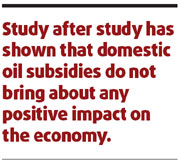Oil subsidies only good in the short term
(China Daily)
Updated: 2008-03-14 07:18
Updated: 2008-03-14 07:18
The Thai government's support for diesel prices will not hide the fact that we must learn to live with higher costs
Poonpirom Liptapanlop, the Energy Minister, has sent a strong signal that it is time for Thai people to learn to live with the era of high oil prices.
The oil prices are beyond anybody's control, as oil is the most important global commodity. Although the government may be able to provide some relief, at the end of the day, the Thai people must learn to cope with the high prices on their own.

Most analysts now believe that oil prices will not fall again. On Wednesday, the price held steady after falling back from Tuesday's record of nearly $110 a barrel. The dollar's weakness has fuelled much of the oil price hikes recently as investment funds seek a hedge in hard assets.
Because the investment funds have been losing money as a result of the US subprime loan crisis, they have bet on the oil market instead. Oil prices are thus the work of both intense speculation and a real global demand increase.
At this price level, Poonpirom admits that we are already entering a period of energy crisis. We should therefore learn to use energy wisely and in the most efficient way.
However, the Thai National Energy Policy Committee agreed to provide a subsidy for diesel at 90 satang ($0.03) per liter. Of this, 50 satang will come from a reduction of the oil companies' contribution to the Energy Conservation Fund, and 10 satang will come from a reduction of the contribution to the Fuel Fund.
The remaining 30 satang will come directly from the subsidy of the Fuel Fund. The government is capping the diesel price at Bt29.94 per liter. Poonpirom has maintained that this diesel subsidy measure will be implemented only temporarily until the end of July. She would not repeat the mistake of the Thaksin government, which subsidized domestic oil prices and ended up causing the Oil Fund to lose Bt90 billion.
Diesel is being subsidized at this point because it is the main fuel used in the transport sector. Already, Thailand has inefficient logistics networks, forcing the country to rely on diesel-based truck transport.
Piyasavasti Amaranand, the former energy minister in the Surayud government, did an excellent job of ending most of the price distortion measures created in the oil industry. After his leaving office, the Oil Fund bounced back into the black.
Study after study has shown that domestic oil subsidies do not bring about any positive impact on the economy, although they help reduce the shock in the short term. But at the end of the day, somebody will have to pay for this subsidy.
The Oil Fund's loss of Bt90 billion could have been used for building schools or the mass transit system. The government is subsidizing diesel until July because by that time there will be more natural gas vehicles (NGV) outlets and facilities to meet the demand.
Now, most taxis and private cars are using liquefied petroleum gas (LPG), which is more expensive. If anyone drives along Viphavadee Road near Central Lad Phrao, they will see taxis lined up in a long stretch waiting to fill up their tanks with NGV. Once the NGV outlets and facilities are built over a broader network, which should cover the whole of Thailand, we can expect to see more efficient energy usage.
Poonpirom has also asserted that the temporary measure to cushion the diesel price will not hurt the Oil Fund, which is now enjoying a surplus of Bt3-Bt4 billion.
What the government is doing is simply reducing the contribution flowing into the Oil Fund. Part of the Oil Fund will be used to finance the mass transit systems. But since it takes at least four years to build a mass transit system, the government thinks that it can use this money to relieve the plight, albeit temporarily, of the Thai consumer first.
On the other hand, the government will also be promoting alternative fuels such as bio-diesel, gasohol, and NGV. These will allow the public to have more energy options.
We actually do not favor the temporary subsidy of diesel because the sharp rise in oil prices is making a 90-satang subsidy look meaningless. The rest of the world is still consuming despite the higher oil prices. We, too, have to learn to live with this reality.
The Nation/Asia News Network
(China Daily 03/14/2008 page10)
|
|
|
|